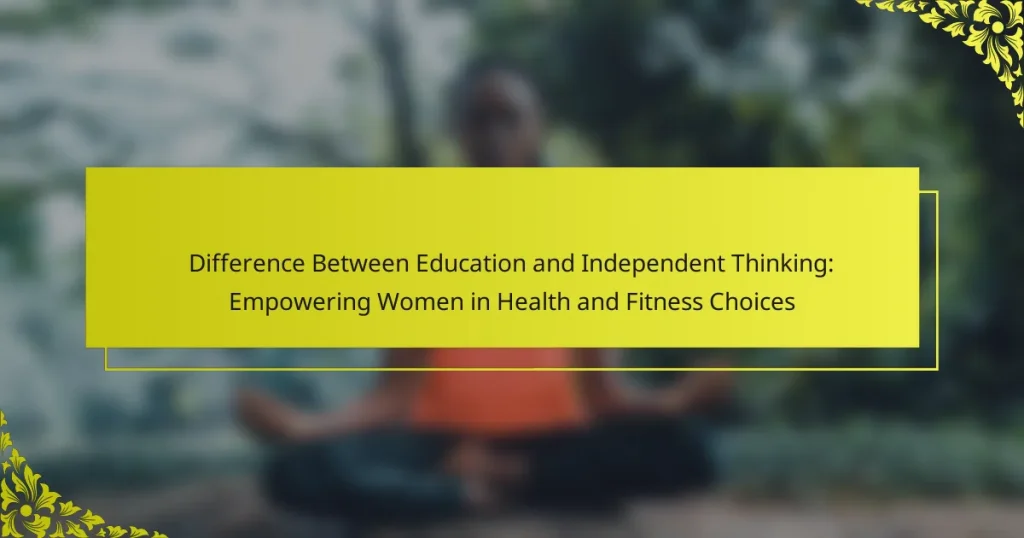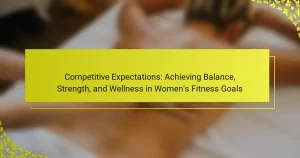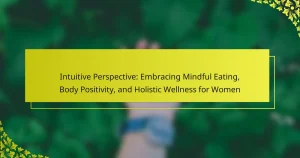Empowering women in health and fitness choices relies on understanding the difference between education and independent thinking. Education enhances knowledge and fosters critical evaluation of health information. Independent thinking promotes informed decision-making and personal fitness choices. Together, they lead to healthier lifestyles and improved well-being for women.
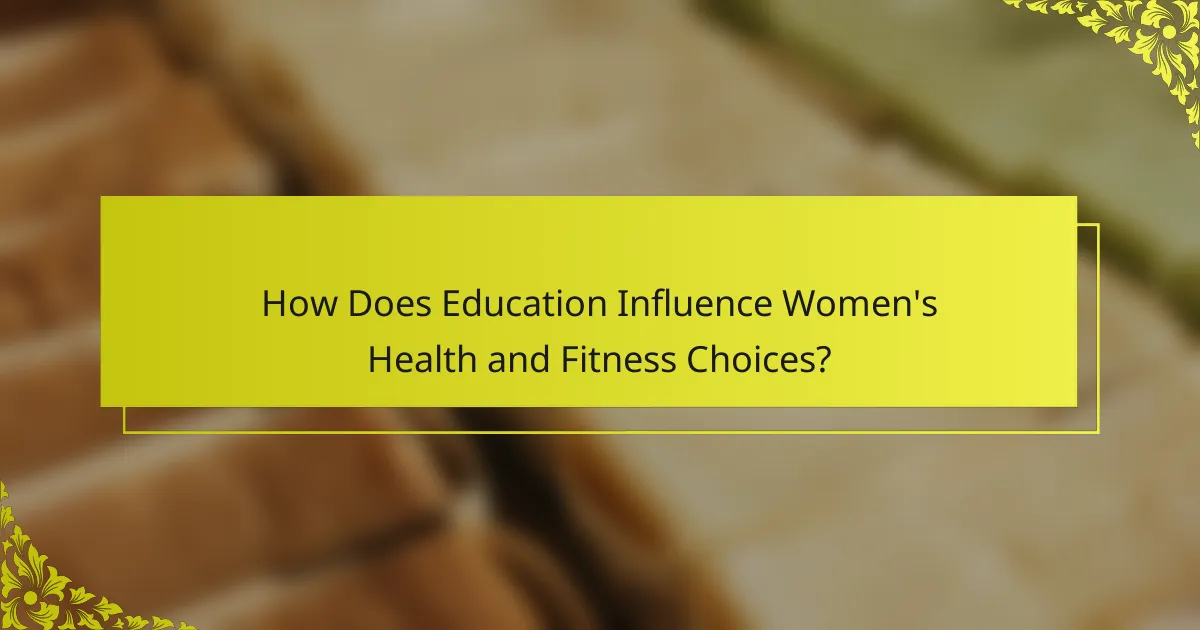
How Does Education Influence Women’s Health and Fitness Choices?
Education significantly shapes women’s health and fitness choices by enhancing knowledge and fostering independent thinking. Higher education levels correlate with better health decisions, as educated women are more likely to understand nutrition, exercise benefits, and preventive care. This empowerment leads to healthier lifestyles and improved well-being. Additionally, education promotes critical thinking, enabling women to evaluate health information critically and make informed choices. As a result, educated women often engage in regular fitness activities and prioritize their health, reflecting a unique attribute of education’s impact on personal health management.
What Are the Key Components of Health Education for Women?
Health education for women emphasizes informed decision-making and self-advocacy in health and fitness. Key components include awareness of reproductive health, understanding nutrition, recognizing mental health importance, and access to preventive care. Empowering women through education fosters independent thinking, enabling them to make healthier lifestyle choices. Programs should prioritize tailored information to address unique health needs, enhancing overall well-being and promoting active participation in health management.
How Can Women Distinguish Between Reliable and Misleading Health Information?
Women can distinguish between reliable and misleading health information by evaluating sources critically. Focus on evidence-based research from reputable organizations and experts. Check for citations, peer-reviewed studies, and credentials of authors. Be wary of sensational claims or unsupported testimonials.
Understanding the difference between education and independent thinking is crucial. Education provides foundational knowledge, while independent thinking empowers women to assess information critically. This skill is vital in making informed health and fitness choices.
Women should consider the context of information. Reliable sources often present a balanced view, while misleading ones may oversimplify complex issues. Look for transparency in data presentation and potential conflicts of interest.
Engaging in discussions with healthcare professionals can further clarify health information. They can provide insights and validate the credibility of sources. This collaborative approach enhances understanding and supports informed decision-making.
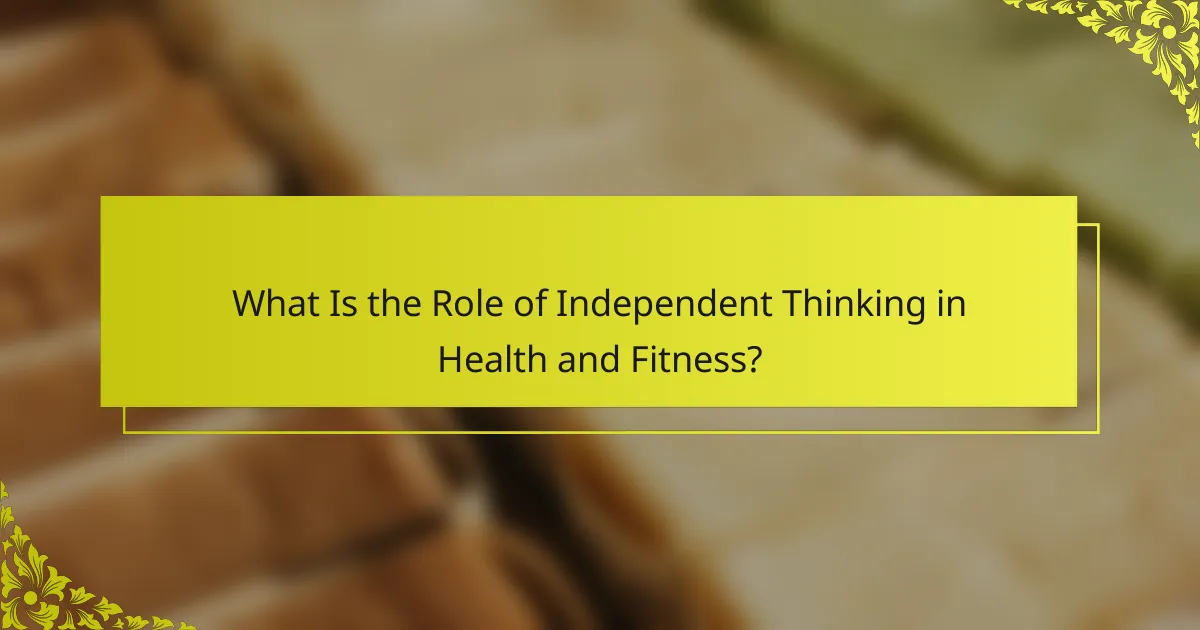
What Is the Role of Independent Thinking in Health and Fitness?
Independent thinking empowers women in health and fitness by promoting informed decision-making. It encourages critical evaluation of health information and personal fitness choices. This autonomy leads to better adherence to fitness regimens and healthier lifestyle choices. Studies show that women who engage in independent thinking are more likely to prioritize their well-being and seek tailored fitness solutions, enhancing overall health outcomes.
How Can Women Cultivate Independent Thinking in Their Health Decisions?
Women can cultivate independent thinking in their health decisions by prioritizing education and critical analysis. Education empowers women to understand health information, while independent thinking encourages them to question conventional wisdom. This dual approach fosters informed decision-making, enabling women to assess their unique health needs.
Research shows that women who engage in independent thinking are more likely to seek out diverse health resources, leading to better health outcomes. For instance, independent thinkers often explore alternative therapies alongside traditional medicine, tailoring their health strategies. This holistic perspective enhances their ability to make choices that align with their personal values and lifestyle.
Moreover, fostering a supportive community can amplify independent thinking. Women who share experiences and insights create an environment where questioning and exploration are encouraged. This collective knowledge builds confidence and reinforces the importance of individualized health decisions.
In conclusion, by embracing education, critical thinking, and community support, women can effectively navigate their health choices, leading to empowerment and improved well-being.
What Strategies Enhance Critical Thinking Skills?
To enhance critical thinking skills, focus on strategies that promote independence and empowerment. Encourage women to engage in self-directed learning, analyze health information critically, and participate in discussions that challenge assumptions.
Promoting collaborative learning environments fosters diverse perspectives, enhancing critical analysis. Incorporating real-world problem-solving scenarios allows for practical application of critical thinking.
Additionally, providing resources that emphasize evidence-based practices in health and fitness supports informed decision-making. Regular reflection on personal choices and outcomes can further strengthen critical thinking abilities.
How to Evaluate Personal Health Needs and Goals?
To evaluate personal health needs and goals, women should prioritize education and independent thinking. Understanding personal health requires assessing unique attributes like fitness levels, dietary preferences, and emotional well-being. Set specific, measurable goals based on these evaluations. For example, a goal might be to increase physical activity by 30 minutes daily. Empowerment through education fosters informed choices, leading to sustainable health outcomes. As a result, women can create personalized health plans that align with their individual needs and aspirations.

What Are the Universal Benefits of Education in Women’s Health?
Education significantly enhances women’s health by fostering independent thinking and informed decision-making in health and fitness. Empowered women are more likely to adopt healthier lifestyles, seek preventive care, and advocate for their health needs. Studies show that educated women prioritize nutrition and exercise, leading to improved overall well-being. Furthermore, education helps women navigate healthcare systems effectively, ensuring better access to resources. By promoting critical thinking, education enables women to challenge societal norms and make choices that align with their health goals.
How Does Knowledge Empower Women to Make Informed Choices?
Knowledge empowers women to make informed choices by enhancing their decision-making capabilities in health and fitness. Education provides foundational information, while independent thinking fosters critical analysis of that information. This combination enables women to evaluate options, understand risks, and choose strategies that align with their personal health goals. Access to accurate information and the ability to think critically are root attributes that significantly impact women’s empowerment in this context. As a result, women are more likely to pursue healthier lifestyles and advocate for their well-being.
What Are the Common Health Issues Addressed Through Education?
Education addresses various health issues, including nutrition, physical fitness, mental well-being, and chronic disease management. Empowering women through education enhances their ability to make informed health and fitness choices. For instance, women educated about nutrition can better manage weight and prevent obesity-related diseases. Additionally, understanding mental health promotes resilience and coping strategies. Access to education also correlates with improved health literacy, leading to proactive health behaviors. This empowerment fosters independence in health decisions, ultimately benefiting overall community health.
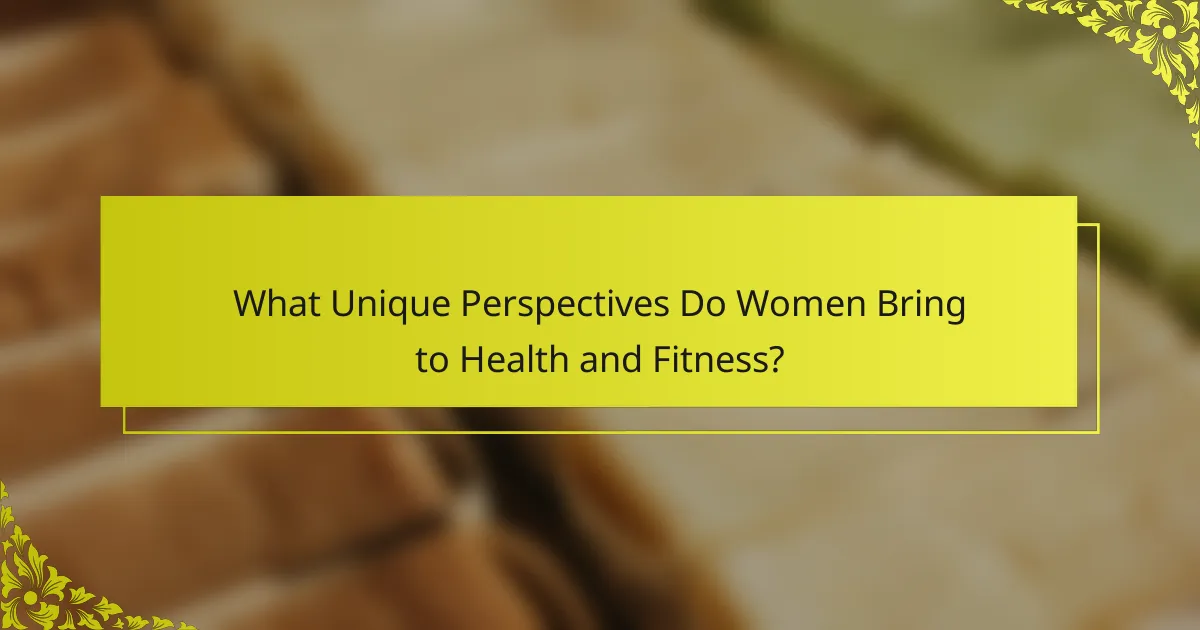
What Unique Perspectives Do Women Bring to Health and Fitness?
Women bring diverse perspectives to health and fitness by emphasizing holistic approaches and community support. Their unique experiences shape inclusive practices that cater to varied needs. Research shows women prioritize mental well-being alongside physical health, leading to comprehensive fitness strategies. This empowerment fosters independent thinking, encouraging informed health choices that reflect personal values and lifestyles.
How Do Cultural Backgrounds Influence Women’s Health Choices?
Cultural backgrounds significantly influence women’s health choices by shaping beliefs, values, and access to information. Education fosters independent thinking, empowering women to make informed health and fitness decisions. Factors such as socioeconomic status, cultural norms, and family expectations play critical roles. For instance, women from collectivist cultures may prioritize family health over personal fitness, impacting their choices. Empowered women often seek diverse resources, enhancing their health literacy and autonomy. This shift leads to improved health outcomes and a greater emphasis on personal well-being.
What Are the Unique Challenges Women Face in Achieving Fitness Goals?
Women face unique challenges in achieving fitness goals due to societal expectations, lack of representation, and limited access to resources. These factors can hinder independent thinking and informed decision-making in health and fitness. Education empowers women to understand their bodies, set realistic goals, and navigate misinformation. Additionally, women often encounter pressure to conform to specific body ideals, which can detract from personal fitness journeys. Addressing these challenges requires fostering an environment that encourages autonomy and critical thinking in health choices.

What Rare Attributes Contribute to Effective Health Decision-Making?
Education and independent thinking enhance women’s health decision-making through unique attributes such as critical analysis skills and personalized knowledge. These rare attributes empower women to evaluate information, question norms, and make informed choices. Access to diverse educational resources and supportive communities further strengthens their capacity for independent thought. As a result, women can navigate health and fitness landscapes more effectively, leading to improved outcomes.
How Can Personal Experiences Shape Health Perspectives?
Personal experiences significantly influence health perspectives by shaping beliefs and choices. Education and independent thinking empower women to make informed decisions in health and fitness. Personal narratives often highlight unique attributes like resilience and adaptability, which can motivate others. Empowerment through shared experiences fosters a supportive community, enhancing overall health outcomes. As a result, women are more likely to take charge of their health and fitness journeys, leading to improved well-being.
What Role Does Community Support Play in Women’s Health Choices?
Community support significantly influences women’s health choices by fostering empowerment and informed decision-making. Access to shared experiences and resources enhances education, enabling women to think independently about their health. Research shows that women with strong community connections are more likely to engage in health-promoting behaviors and seek preventive care. This social network acts as a unique attribute, providing encouragement and accountability, which are crucial for sustained health and fitness improvements. Ultimately, community support cultivates an environment where women feel confident to prioritize their health and well-being.
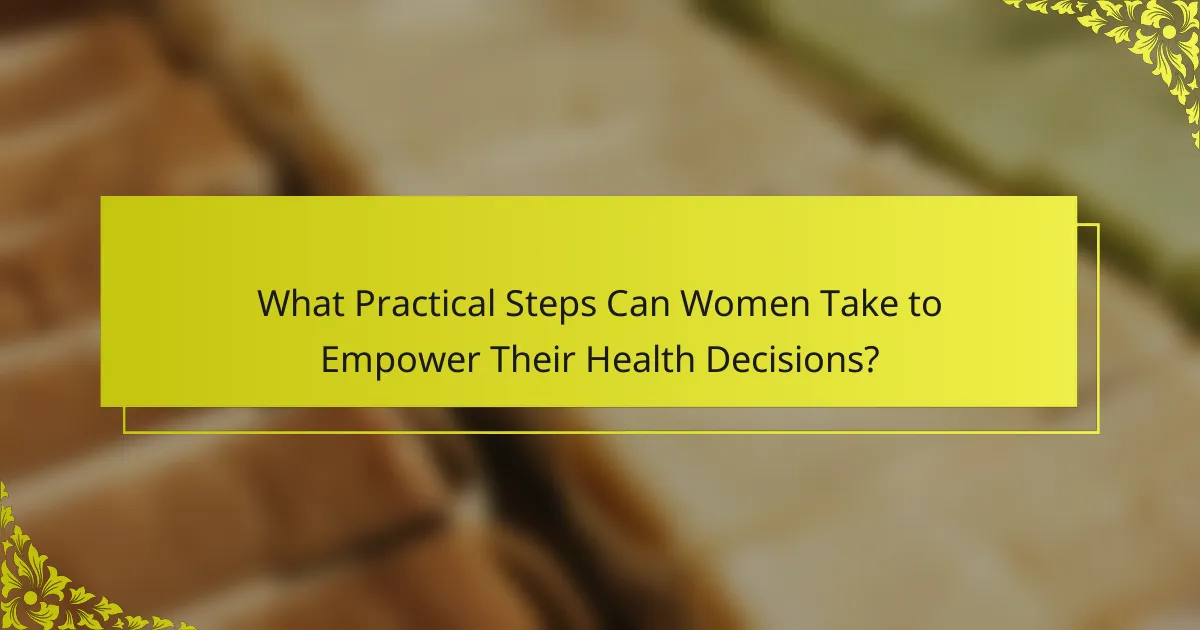
What Practical Steps Can Women Take to Empower Their Health Decisions?
Women can empower their health decisions by prioritizing education and fostering independent thinking. First, seek reliable health information from trusted sources, such as healthcare professionals or reputable organizations. Second, engage in discussions with peers to share experiences and insights. Third, critically evaluate health claims and research studies to develop informed opinions. Fourth, set personal health goals based on individual needs and preferences, rather than societal pressures. Lastly, practice self-advocacy by communicating openly with healthcare providers about concerns and preferences. These steps enhance confidence and promote informed choices in health and fitness.
What Are the Best Practices for Continuous Learning in Health and Fitness?
Empowering women in health and fitness choices involves continuous learning through education and independent thinking. Best practices include setting personal goals, seeking diverse sources of information, engaging in community discussions, and applying knowledge practically. These practices enhance decision-making and foster confidence. Women should prioritize critical thinking skills to evaluate health information effectively. As a result, they can make informed choices that align with their unique fitness journeys.
What Common Mistakes Should Women Avoid in Their Health Journeys?
Women should avoid relying solely on external advice without critical evaluation. Emphasizing independent thinking fosters better health choices. Common mistakes include neglecting personal needs, ignoring body signals, and following trends without understanding. Empowerment comes from education and self-awareness, enabling informed decisions tailored to individual health journeys.
How Can Women Leverage Social Media for Health Education?
Women can leverage social media for health education by actively engaging with credible sources and sharing knowledge. Social media platforms provide a unique opportunity for women to access diverse health information and connect with experts. By following health influencers and participating in discussions, women can enhance their understanding of fitness choices. This independent thinking fosters empowerment, enabling informed decisions about health. Engaging with interactive content, such as live Q&A sessions or webinars, further enriches their learning experience. Additionally, sharing personal health journeys can inspire others and build supportive communities.
